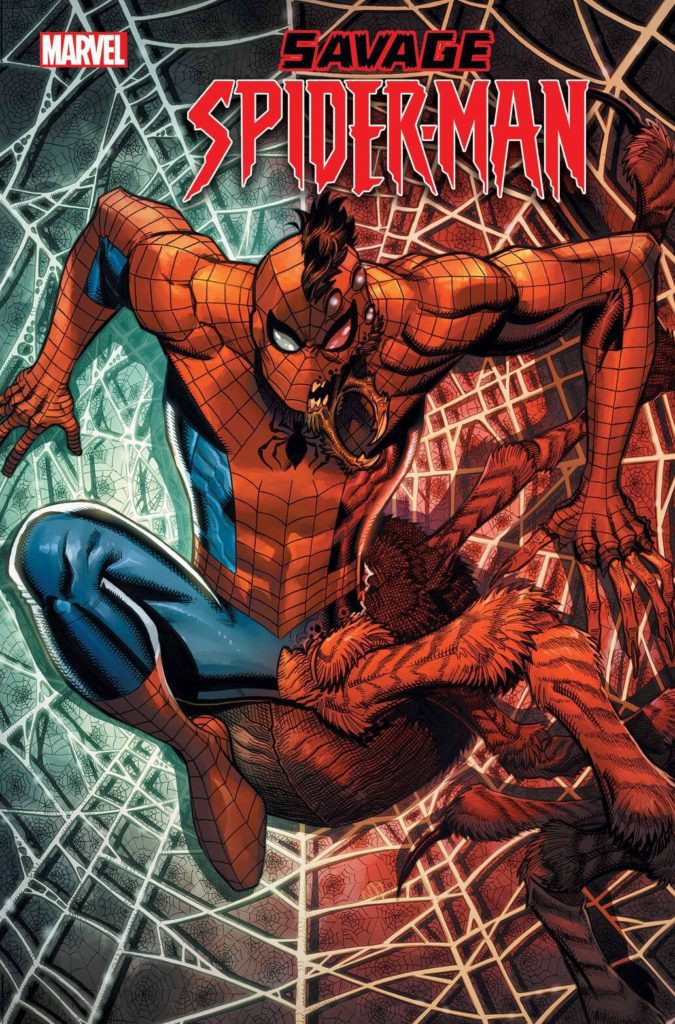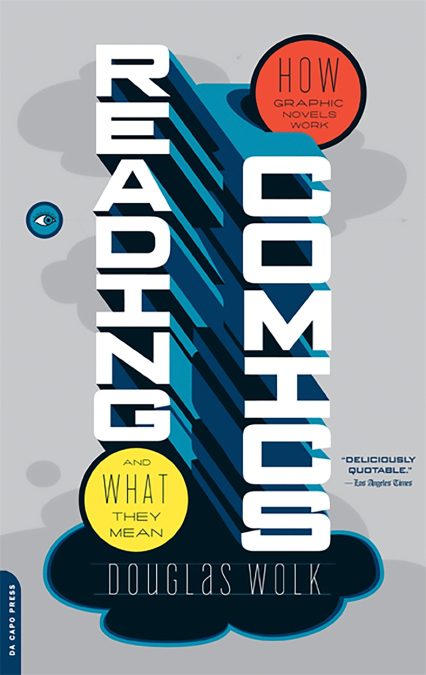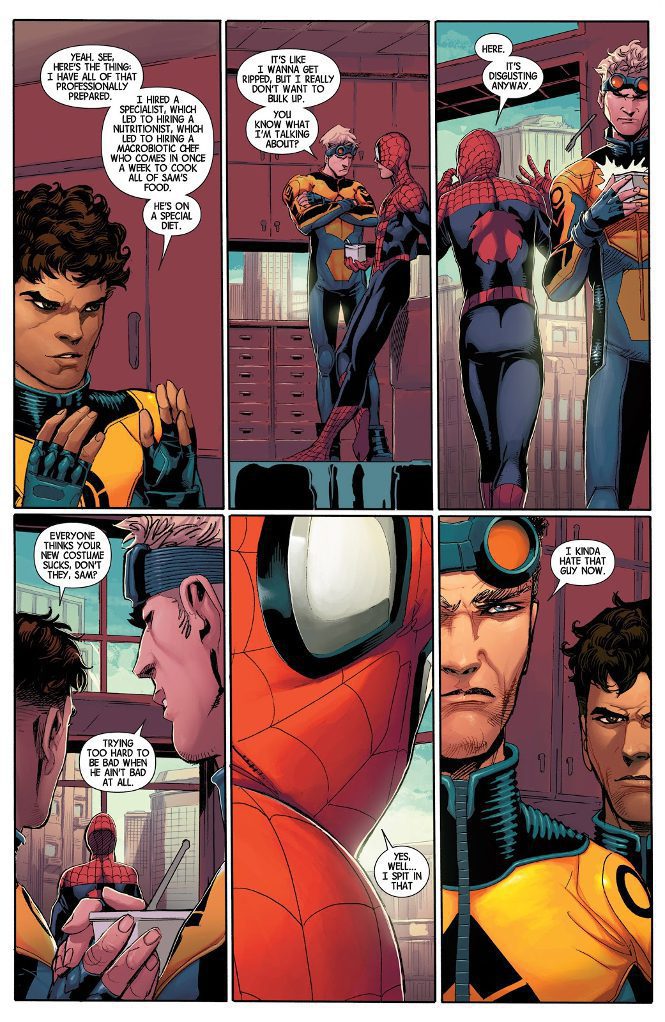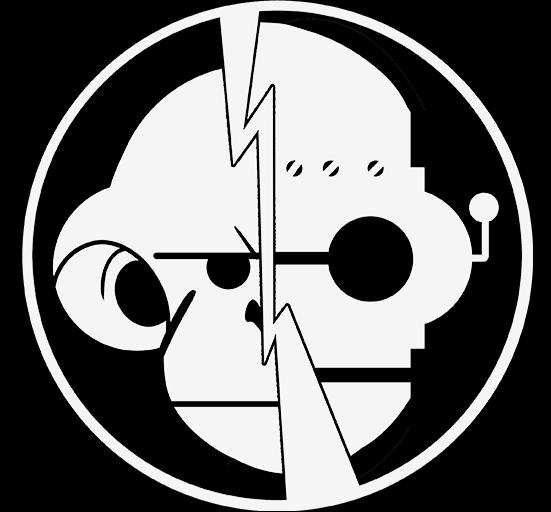Every so often, Marvel likes to play around with the Spider-Man format. This usually involves altering Peter Parker in some way so that they can portray a ‘new’ Spider-man with a different personality. In the past poor Parker has been mutated so that he grew additional arms to more closely resemble a spider; infected with a parasitic alien goo that brought out his darker side; had cosmic powers bestowed upon him; and been possessed (for want of a better word) by the spirit of one of his arch enemies, Doc Ock.
In the most recent comics, a man named Wulf has injected Parker with a drug called A-Plus. Under normal circumstances this would temporarily improve the victims performance before ultimately sapping their intelligence but with Parker it reacts differently due to his radioactive blood. The outcome is Savage Spider-Man, a new primal beast of a character who has just been given his own monthly comic of the same name. Issue 1 is out now and it is a difficult comic for new readers to engage with.

There is a problem with ‘mainstream’ comics. And by mainstream, we are of course talking about the two big publishers, Marvel and DC, and their superhero output. The fact that these two publishers are accepted as the face of mainstream comics is a far greater issue with the branding of Comics in general terms because the superhero genre has held sway for so long that it is still seen as being the primary driving force behind the comic industry. This allows people to attack the industry as a whole if the superhero titles aren’t successful. However, just because no-body cares about the most recent Superman comic (although sales for the recent Tom Taylor and John Timm’s Superman: Son of Kal-El appear to be just fine) that does not mean that the Industry is failing. The Comic Industry is a massive beast that covers a range of genres and diverse audiences, and the estimated global worth in 2020 was $3.87 billion.
However, back to the misadventures of Peter Parker. There is a belief in mainstream comics that all readers are the same and that they indulge themselves in the vast universes that Marvel and DC put out. You may be a Marvelite or the DC equivalent but whichever publisher you follow, you will read a number of different titles and know what’s happening with the majority of the characters within that universe. In fact, judging from recent releases, it’s almost imperative that this is the case because the comics are so wrapped up in each other’s stories that even issue 1s of a series rely heavily on background knowledge. The superhero genre has become a collection of metacomics that are, as described by Douglas Wolk in his book Reading Comics, ‘mostly about where their plots and characters are positioned in the matrices of the big superhero narratives.’ This approach makes it very difficult to attract new readers because the publishers have erected a barricade built from decades of stories and comics. The unfortunate side effect is that, no matter how good the scripting and art is, the comic can only be measured against other titles and judged primarily on this shared narrative.

One of my favorite runs from recent years was the epic opus by Jonathan Hickman on Avengers (starting in 2012). His story was meticulously planned from start to finish with a superb collection of artists visualizing his vision. There were, however, moments where I became partially distanced from the story and these usually occurred when characters that I have previously followed in comics, but not for a number of years, would act against my understanding of their personality. Spider-Man is the most obvious because at that point in time he was the arrogant and blunt Doc Ock version of the character. Imagine picking up an Avengers comic today, for the first time, and being faced with the Savage Spider-Man with no explanation or elaboration? Comics used to use Editors Notes on a page to help out new readers with quick, often witty, explanations and references to relevant comics that would fill in the gaps. This worked two-fold as it not only provided an element of explanation but also advertised comics that readers might want to pick up. Helpful and commercial but for the most part absent from modern comics.
While discussing the 1980s comic industry, this statement from Benjamin Woo sums up the current superhero comics beautifully: ‘ comics were not only sequestered from the media choices readily available to most people but also increasingly incomprehensible to anyone uninitiated into the culture of fandom.’* Basically, you have to read all of the superhero comics to understand the superhero comics you are reading. Instead the publishers could, fairly easily, tell readers about other titles that compliment the comics they are reading, whether this is other comics in the series, a different comic series, or any number of media spin offs. This, in turn can work the other way, with adverts for a range of comics before a movie, or in game adverts on X-Box or PlayStation tie-ins.
It used to be the case that comics readers got into the hobby through other people. Either parents handing down their old floppies or last month’s issues were shared around the schoolyard between friends. But this segue into Comics has changed over recent years. As comics, especially the superhero genre, have become more of a multimedia product, people are discovering comics through other formats and this makes it harder and harder to cater to all levels of fans. Those who have engrossed themselves in the MCU and related television series and then come to a comic shop may find it difficult to find anything new that they can engage with because none of it ties in with the characterizations they will be familiar with. I came into superhero comics cold and at a time when it was still considered best practice to treat each issue as if it was somebody’s first.
That idiom is no longer the case for most Marvel and DC comics. Instead the publishers have embraced Wolk’s metacomic as standard, further creating a ‘them and us’ situation which is damaging to superhero comics as a whole. As a form of entertainment it has become extremely elitist at the very time it should be opening up to embrace the wider popularity of the form. A cross media strategy could fix the problem. There are adverts for the movies and games in the comics so why not the other way around? We know when the new Spider-Man film is due to be released, even if we don’t even see any trailers because it’s there in the comics we love. How many people who see the film knows when (or even where) to get the comics from? This approach is more important for non-superhero comics because, quite often, people aren’t aware that the movie is based on a comic. A pre-movie advert with a hint as to where to shop could make a massive difference to the sales of the comic, which is beneficial to everyone involved.

There is a difference between commitment to character and self imposed barricading of narrative, making it impossible for those on the outside to get in. Superhero comics need to make themselves more accessible. Whether that involves simply adding a ‘previously in’ page or integrating the current status into the story itself from issue to issue, or even Editor’s Notes, as previously mentioned. And we need to rethink our discussions on what Comics are so that the obsession with superheroes does not automatically become the default setting when talking about the state of the industry. If superhero comics wish to remain on the fringes of the medium, despite the massive popularity of the genre elsewhere, then the discussion about Comics needs to be refocused on the rest of the industry so that the medium can reach as many people as possible. You just need to take this article as an example of the problem. I was considering Comics Culture and the majority of this is about superheroes and the Big Two publishers, which itself is a loaded term. It’s such a difficult cliché to break away from but one that is necessary in order to successfully discuss Comics Culture and not just superhero stories. The industry survived because of the growth of superhero comics and now it is growing even further, beyond this single genre. By celebrating all comics and the media off-shoots, everybody wins, even Marvel and DC.
Notes
*Taken from Comics Studies: A Guidebook Edited by Charles Hatfield and Burt Barty

